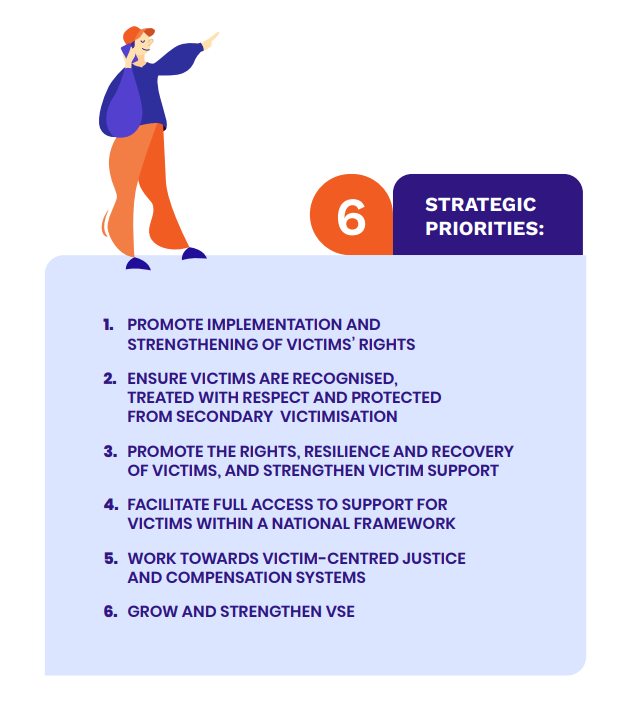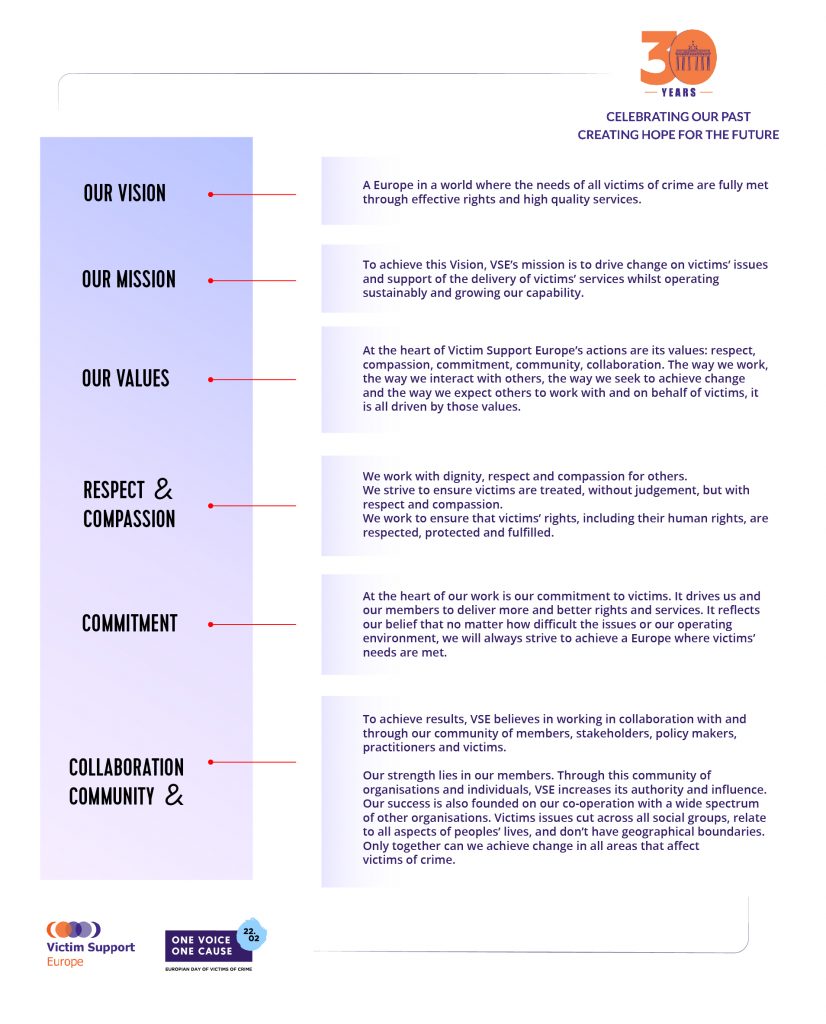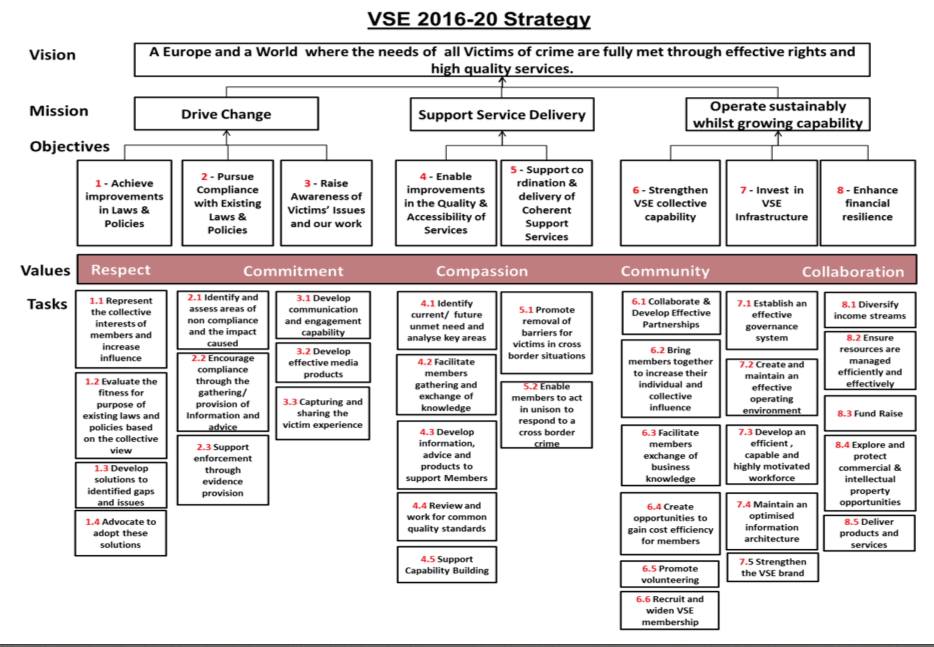Organisational Documents
In this section you will find such organisational documents as VSE’s Constitution, Strategy, Evaluations, Work Programme, Annual Reports, Standards and Accreditation and various policies.
Constitution | Strategy | VSE Evaluations | Work Programme | Annual Reports | Standards and Accreditation | Equality Policy | Data Protection Policy | Volunteering Policy | Internship Policy
Constitution
Victim Support Europe’s Constitution provides a detailed overview of the organisation, its founding members, rules of admission and termination of membership, details on the proceedings at the General Assembly, and the organisation’s objectives.
VSE’s objectives are defined in the Constitution as follows:
a) to drive forward improvements on victims’ issues and support the delivery of high quality victims’ services whilst operating sustainably and growing VSE’s capability.
b) to promote justice, freedom and security for victims and others affected by crime, including the prevention of crime, re-victimisation and secondary victimisation, and to work to ensure the needs of victims are met.
c) to advance knowledge and awareness of victims’ rights, the problems faced by victims and those affected by crime, and the remedial action required.
d) to promote fair and equal treatment of victims of crime and those affected by crime, and to promote the human rights of victims and those affected by crime.
e) to promote the relief of poverty, sickness and distress which has arisen as a result of any criminal offence committed by any person or through any means whatever.
Strategy
Towards the near future, in 2021 to 2025, VSE will promote the following strategic priorities:
- Promote implementation and strengthening of victims’ rights
- Ensure victims are recognised, treated with respect and protected from secondary victimisation
- Promote the rights, resilience and recovery of victims, and strengthen victim support
- Facilitate full access to support for victims within a national framework
- Work towards victim-centred justice and compensation systems
- Grow and Strengthen VSE

VSE’s Strategy for 2016-2020 offers an outline of our organisation’s goals for the present and the near future.
VSE’s eight objectives are:
- Advance improvements in laws and policies
- Pursue compliance with existing laws and policies
- Raise awareness of victims’ issues and our work
- Enable improvements in the quality and accessibility of services
- Support coordination and delivery of coherent services
- Strengthen VSE collective capability
- Invest in VSE infrastructure
- Enhance financial resilience
VSE’s vision, mission, and values are also explained in the Strategy document.

VSE Evaluations
Victim Support Europe’s Monitoring and Evaluation (M&E) process, which started in 2015, has two main area’s of focus. The first focus area – Monitoring – revolves around the already implemented activities, including their efficiency and effectiveness. The second focus area – Evaluation – also looks into efficiency and effectiveness, however, it is centered around VSE’s intervention strategy and the processes used. Aside from the two main focus areas, the M&E program is also dedicated to the products developed by the network.
You may find our Evaluation reports from previous years below:
Work Programme
The following sets outs the main work programme priorities in accordance with our Operating Grant. It does not set out various ongoing commitments such as ad hoc support, attendance of conferences etc. In addition to these activities, VSE is also involved in several projects.

1) Priority Topics:
- Hate crime
- Cybercrime
- Terrorism
- Gender Equality
- Making rights a reality – enforcement of (EU) laws (findings of VOCIARE): developing a vision of national victim services; 116 006/ Helplines; Case management systems; Data protection
2) Engagement with EU Entities
- Develop clear advocacy plan to press for specific policy agendas (Compensation, 116006, etc).
- European Parliament: Election activities, engagement strategy, intergroup on victims Preparation for election: identify 3-4 priorities to promote e.g.
- EU Commission – Support to Justice, Home, EEAS; Identify upcoming legislation and actions, briefing of new commissioners and meetings with them.
- EU NGOs – Roundtable, ad hoc joint initiatives and support.
- UN – Counter terrorism unit (handbook), UNODC (Handbook and education for justice), UN Victims advocate (Jane Connors – Mapping of services, support for victims of sexual violence), preparation for UN Crime Congress (Japan 2020, but possible meeting in Greece – http://www.un-congress.org/ )
- Council of Europe (CoE): application for consultative status submitted, will hold meetings, and engage at Annual Conference. To be determined how work together.
- World Bank
- Victim Support Asia: Attend conference
- FRA, EIGE, EUROPOL, EUROJUST
3) Members Events:
- Annual Conference
- Leaders’ event (workshop)
- Regional Exchange
- Staff Exchange
- Centres of Excellence – 3 Online meetings and 1 workshop
- Training modules – 4 workshops to be held, one training module – topics and timing to be determined (at least one during Annual conference)
- INVICTM Symposium
4) Policy Development
5) Standards and accreditation
- Promote the use of the standards outside of full membership
- Determine if willing to carry out accreditation of others, what should be the cost, risks, etc?
- Determine if/ how to develop details and guidance around standards
- Promote the standards internationally (incorporate into national VS position paper)
6) Victim Assistance
- Improve the way VSE supports victims who contact us directly:
- Referral system – guidance for staff, timeframe for replies etc.
- Increase website guidance:
- Interactive mapping of victim support services – continue to expand the map – for at least two countries do full mapping.
- Immediate assistance after mass scale terror attacks: information provision, referral,long term contacts
7) Information gathering
- Mapping of laws
- Mapping of services
- Monitor EU, ECHR case law and produce regular reports and analysis
- Expert Database
- Information collection templates
- Knowledge database
- Volunteering networks and opportunities – to disseminate to members
8) VSE Internal Structures
- Implement new intranet and online membership application system.
- Review and Develop internal documents on staff and volunteer management e.g. data protection policy, health and safety doc.
- Financial operations policy – starting with reserves policy and finance management.
- Staff training and training policy.
9) VSE communications and branding
- New VSE Website
- Develop new, create ways to increase publicity of VSE activities and events, as well as priority topics
- Media Content creation
- 4 newsletters,
- 1 campaign video
- 2 Media campaigns to be implemented
- 2 PR campaigns in line with Annual Conference and Leaders’ Event
Annual Reports
VSE’s annual reports provide an overview of each year of our organisation’s activities. It also contains the President’s address, the Treasurer’s report, and the list of all member organisations.
Reports from previous years can be found below:
Standards and Accreditation
VSE has established a set of standards to ensure high quality, effective, efficient and consistent victim support service. It is a self-regulation system whereby VSE full members assess themselves and VSE reviews the process.
Minimum standards can be a useful tool to guide victim support organisations in developing high quality, effective, efficient and consistent services. Minimum standards can reduce the risk of services harming victims and wasting scarce resources. Moreover, minimum standards give VSE confidence in its Members and help protect VSE’s reputation. This confidence is also likely to be reflected in national institutions and victims’ attitudes towards those services. Finally, such standards can guide organisations and governments around the world who are developing and improving victim support services.
To learn more about the VSE’s system of standards and accreditation, please, visit our new page dedicated to Standards and Accreditation.
Equality Policy
Coming soon
Data Protection Policy
With the recent changes in the laws and regulations governing data collection, the protection of personal data, and the use of that data, specifically with respect to the General Data Protection Regulation (GDPR) protocols implemented in the EU as of May 25, 2018, we have updated and clarified our data collection policies to ensure compliance with the strictest interpretation of the GDPR to assure our members and partners that the data they provide is safely stored and properly used.
Volunteering Policy
Volunteers may support VSE work in a wide range of activities, particularly in project related activities, in event organisation and in communications tasks. VSE values the involvement of volunteers in its work in various ways. Volunteers help enhance the range and quality of services provided by VSE by putting their time, skills and knowledge at its disposal. They help keep VSE’s work relevant to victim support organisations and victims of crime throughout Europe by bringing a range of expertise, backgrounds and experience into the organisation.
This volunteering policy sets out the broad principles, practices and procedures which Victim Support Europe will follow in the appointment, management and supervision of volunteers. It is intended to ensure good practice in the involvement of volunteers in VSE’s works, and promote understanding of the respective roles of staff and volunteers in the organisation. This volunteering policy defines the rights and duties of volunteers and the obligations of VSE towards its volunteers.
Internship Policy
VSE values the involvement of interns in its work in various ways. Interns help enhance the range and quality of services provided by VSE. They help keep VSE’s work relevant to victim support organisations and victims of crime throughout Europe by bringing a range of expertise, backgrounds and experience into the organisation.
VSE usually takes on 2 paid interns per year, each for a 6-month period under the Belgian Professional Immersion Contract (http://www.actiris.be/ce/tabid/197/language/fr-BE/Convention-d-immersion-professionnelle.aspx). Interns are under the direct supervision of VSE Executive Director, but works with the whole VSE team in terms of conducting research, drafting reports and papers, taking notes, attending internal and external meetings, supporting the organisation and delivery of VSE events, supporting VSE external communication and visibility on social media, etc.
